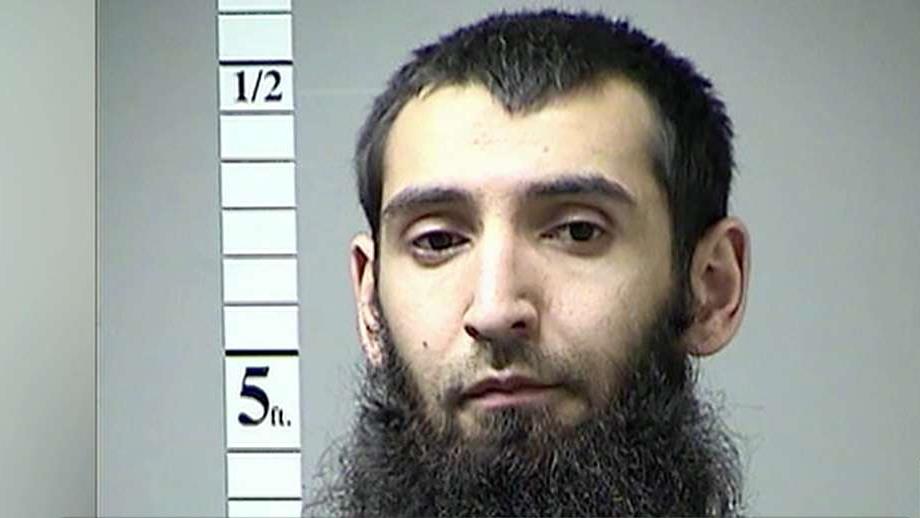NYC terror suspect's Uber gig reignites concerns over safety of ride sharing
Revelations that the New York terror suspect Sayfullo Saipov worked as an Uber driver reignited concerns this week about the company’s screening processes and questions about the “stranger-danger” bias in the gig economy.
Police say the 29-year-old suspect worked as an Uber driver for six months in Paterson, N.J., giving more than 1,400 rides to passengers, before allegedly running down and killing eight people in a rented Home Depot truck near the World Trade Center Memorial in Manhattan on Halloween.
Uber confirmed that Saipov was one of its drivers at the time of the attack, and added that it was “horrified by this senseless act of violence,” and has “reached out to law enforcement to provide our full assistance.”
Bhairavi Desai, president of the New York Taxi Workers Alliance, a union representing approximately 15,000 taxi drivers in New York City, said that in attempt to monopolize any given city’s driving service options, Uber “cuts corners to maximize their own profits.”
“This comes at a cost to both Uber’s drivers and the society at large,” said Desai, who claims that the independent contractor status of Uber drivers denies them the benefits of employees, such as minimum wage, overtime protections, unemployment insurance and Social Security contributions.
Uber built a business model catering to people who already have jobs and are looking for a second income, Desai said, which means it’s “not their day-to-day bread and butter.” Taxi drivers, Desai argues, are more closely monitored and have a “level of [professionalism] expected from day one,” because they are employees, not contractors.
As of 2015, the gig economy – a term to describe an economy where temporary jobs are commonplace, with independent contractors and freelancers taking the place of full-time employees – accounted for 16% of the workforce, according to research by economists Lawrence Katz and Alan Krueger.
In such a ride-sharing environment, passengers can be put in danger, Desai said, arguing that Uber is more concerned with flooding the market with new drivers than doing proper background checks, including government fingerprinting, which take anywhere from four to six weeks to complete.
According to Desai, New York City is the only city in the country that requires ride-hailing drivers to undergo the same background checks as taxi drivers. Anywhere outside of the city's five boroughs, names and Social Security numbers are used to do background checks, not fingerprinting. In the past, Uber has said that fingerprinting does nothing to improve safety and is an unnecessary burden.
While Uber does not require fingerprinting of its drivers, the company said it has a pre-screening process in every country it operates. In the U.S., Uber says it follows the eligibility criteria set forth in local law in screening driver-partners’ backgrounds, including a motor vehicle records and criminal records check that reviews local, state and national records..
According to government records, Saipov had received five previous traffic citations while driving a tractor trailer in Maryland and Iowa in 2011; in Pennsylvania in 2012 and 2015; and in Missouri in 2015.
Disqualifying offenses to become an Uber driver include three or more minor driving violations in past three years or more than five in past five years; driving on a suspended, revoked or invalid license; DUI or drug-related driving offenses; and criminal history such as felonies, violent crimes or sexual offenses, according to Uber’s website,
A source close to Uber told FOX Business that Saipov passed his most recent background check with the company in July 2017.
Paul Oyer, economics professor and senior fellow at the Stanford Institute for Economic Policy Research, argues that although Saipov's role as an Uber driver is clearly “problematic from a public relations perspective for Uber and, by extension, for other gig companies that arrange for personal interaction between strangers,” it shouldn’t reflect on the company or other gig economy platforms any more than previous terror attacks should reflect on those employers of the perpetrators.
Stephen Paddock, the Las Vegas shooter who killed 58 people at a country music festival on Oct. 1, reportedly worked over a 10-year period as an IRS agent, a defense auditor and a letter carrier for the U.S. Postal Service, with no prior criminal history.
“There are many parts of the gig economy that bring individuals together in smaller spaces where there is, theoretically, a risk of harm,” added Oyer. “But there is also a large set of the gig economy doing remote work, where this type of incident is less relevant.”




















